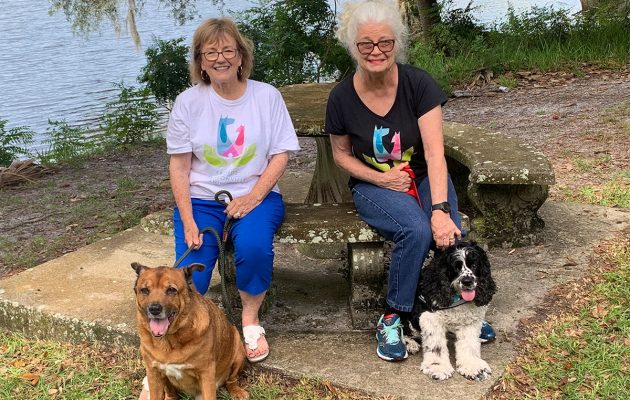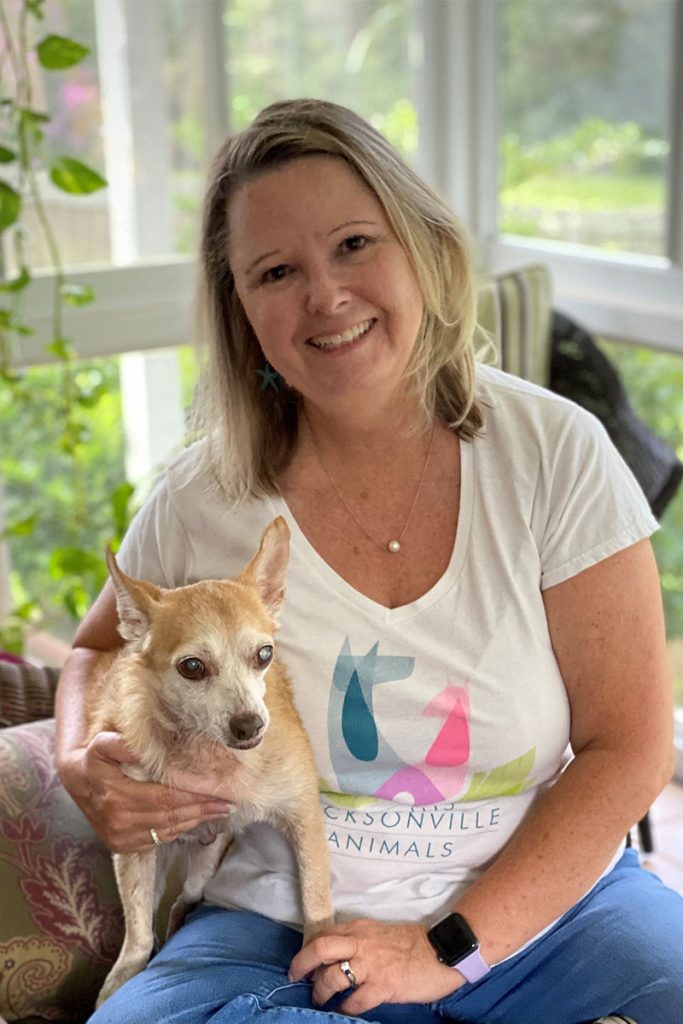Friends of Jacksonville Animals (FOJA) celebrates 4,000th shelter dog treated for heartworm disease

The nonprofit Friends of Jacksonville Animals (FOJA), has much to celebrate this holiday season. FOJA’s Heart Care Program has successfully treated the 4000th dog for heartworm disease, at Jacksonville’s Animal Care & Protective Services (ACPS). That special 4,000th dog, Elvis, has also been adopted. This healthy, happy ending is the goal for every shelter animal, FOJA President Alicia Strayer said.
The all-volunteer FOJA incorporated in 2008, to save heartworm-positive, otherwise adoptable shelter dogs from euthanasia. Since then, their mission has expanded to fund specialized medical care, enrichment, adoption promotion and animal welfare advocacy.
FOJA’s founders, rescuer Carolyn Edwards, ACPS volunteers Sherri Audette, Ginger Hughes, Jill Mero and Margie Yarborough reacted when they learned that half of ACPS’ dogs were heartworm-positive.
“ACPS couldn’t afford prohibitively expensive heartworm treatment. It costs from $60-$400, depending upon the dog’s size and disease severity. FOJA’s Heart Care Program covers heartworm treatment for shelter or fostered ACPS dogs. It also offers treatment financial assistance to adopters of ACPS heartworm-positive dogs,” Yarborough said. “FOJA’s mission is to raise funds to pay for shelter animal needs above and beyond what ACPS can provide. Some animals need specialized veterinary care that would otherwise be unavailable.”
Strayer said that they have become the conduit for local residents to know that their FOJA donations for critical or specific animal care needs go directly to ACPS, whereas that is not the case with donations to the city. City of Jacksonville donations are deposited into general city funds and are then allocated at the discretion of city government.

FOJA manages animal care initiatives in support of ACPS animals and other pets at risk of becoming homeless . Their Intake Diversion Program helps people avoid surrender of their pet. Some owners face difficult circumstances: seniors on a limited budget cannot afford pet food; some need updated vaccines they cannot afford, to move into or remain in rental or other housing; owners face breed discrimination or conflicts that can be resolved with professional advice, information or resources. FOJA’s goal is to keep owners and pets together.
FOJA members take pride in never saying no, if possible, to needs of the shelter animals or staff, Strayer said. Although staff rarely make requests, last year FOJA learned that ACPS’ ancient washing machine could not handle the daily mountains of laundry. FOJA purchased a commercial washer for the shelter. Charity Watch, the independent charity watchdog that verifies how donation money is spent, has awarded FOJA its highest rating.
Allison Abbott, who asked to chair FOJA’s Heart Care Program, said that since the heartworm treatment program began and the first ACPS shelter dogs were successfully treated, thousands of adoptable dogs have been saved. She said that it is a wonderful feeling to know that every single month more heartworm-positive dogs complete treatment, ready for adoption into forever families.
“In 2012, FOJA’s Heart Care Program began to partner with veterinarians who agreed to provide heartworm treatment for a flat or reduced fee off-site,” Abbott said. Abbott is a Jacksonville native, legal assistant and adoptive mom of her ACPS rescue dog, Coco. Coco successfully beat heartworm disease through FOJA’s program.
Heartworm treatment is complicated and requires a second confirmation test, because false positives occur. After a heartworm disease diagnosis is confirmed, exercise is severely restricted; physical exercise increases the rate of organ damage from heartworms.
Next, an overall health evaluation and diagnostic tests identify other health issues to be addressed before treatment. Heartworm treatment can interfere with or worsen other health conditions already present in the animal.
Bloodwork is necessary to determine the severity of heartworm infestation. A minimum of sixty days is required for the series of injections to be completed. Approximately six-nine months after completion of treatment, testing is repeated to confirm elimination of all heartworms. After successful treatment, oral heartworm prevention medication must be administered monthly, for the animal’s lifetime, to prevent recurrence.
Heartworm disease is a potentially fatal disease transmitted by mosquitoes. It is found in every U.S. state. Left untreated, the preventable disease leads to a slow and painful death. The parasites are foot-long worms that live in the heart, lungs and blood vessels of affected pets, severely damaging organs.
Adult female heartworms produce microscopic microfilaria (baby worms), that circulate in the infected animal’s bloodstream. When a mosquito bites an infected animal, it carries the worms and infects the next animal it bites. The larvae reach maturity within six months. They live from five-seven years in dogs and two-three years in cats. Heartworm disease affects dogs, cats and ferrets. Heartworms also live in other mammals, including, rarely, humans.
For these reasons, veterinarians urge pet owners to start monthly heartworm preventive treatment, which is highly effective when given correctly. However, it is not 100% effective in all animals. Some pets may still become infected with heartworms, despite monthly preventative medication. Most otherwise healthy dogs that test positive for heartworms can be successfully treated. The earlier the disease is detected through an annual blood test, the better.
Puppies should be prescribed heartworm prevention medication by a veterinarian and all dogs should have annual heartworm blood tests during routine vaccine appointments. Heartworm prevention medication is prescribed by a veterinarian after a negative heartworm test.
Cats can also become infected with heartworm disease, but it is less common and more difficult to detect. Currently, there is no safe, approved treatment for feline heartworm disease. Most heartworms in cats do not survive to become adults, but the immature worms can still cause respiratory disease. Owners should consult their veterinarian about heartworm disease exposure and risks for outdoor cats.
Annually, FOJA coordinates with ACPS to identify specific, unfunded projects urgently needed to better care for shelter animals. FOJA welcomes donations to help ensure identified projects can be completed.
For 2022, FOJA President Strayer and ACPS Chief Jennifer Walter have prioritized the following 2022 projects: replacement of worn play yard fencing, privacy screening and sunshade structures (the fencing alone cost $10,000 in 2013). The 2022 total cost for those items has been estimated at $15,000 – $20,000. Other projects include: replacement of worn-out adoption lobby cat enclosures (original to the 2009 building-broken, damaged or no longer properly latch), estimated at $50,000; kennel top covers to prevent escapes by the more athletic dogs; replenishment of pet supplies given out by ACPS Animal Control to help pet owners secure their pets (safe dog run pulley systems).
ACPS currently receives approximately 50 – 100 dogs and cats per day. Animals are brought to the shelter as lost pets, homeless strays, owner-surrendered pets or animals saved and removed from animal abuse situations. Visit the ACPS website at www.coj.net/pets to see lost or adoptable pets, become a foster for a dog or cat awaiting adoption, or to volunteer.
FOJA has no physical shelter or public office to eliminate overhead expenses. All members, officers and board members are unpaid volunteers. The organization’s only expenses are required insurance and taxes. FOJA does not directly accept or rescue animals from the public, but they do accept donations and volunteers through their website.
By Julie Kerns Garmendia
Resident Community News






